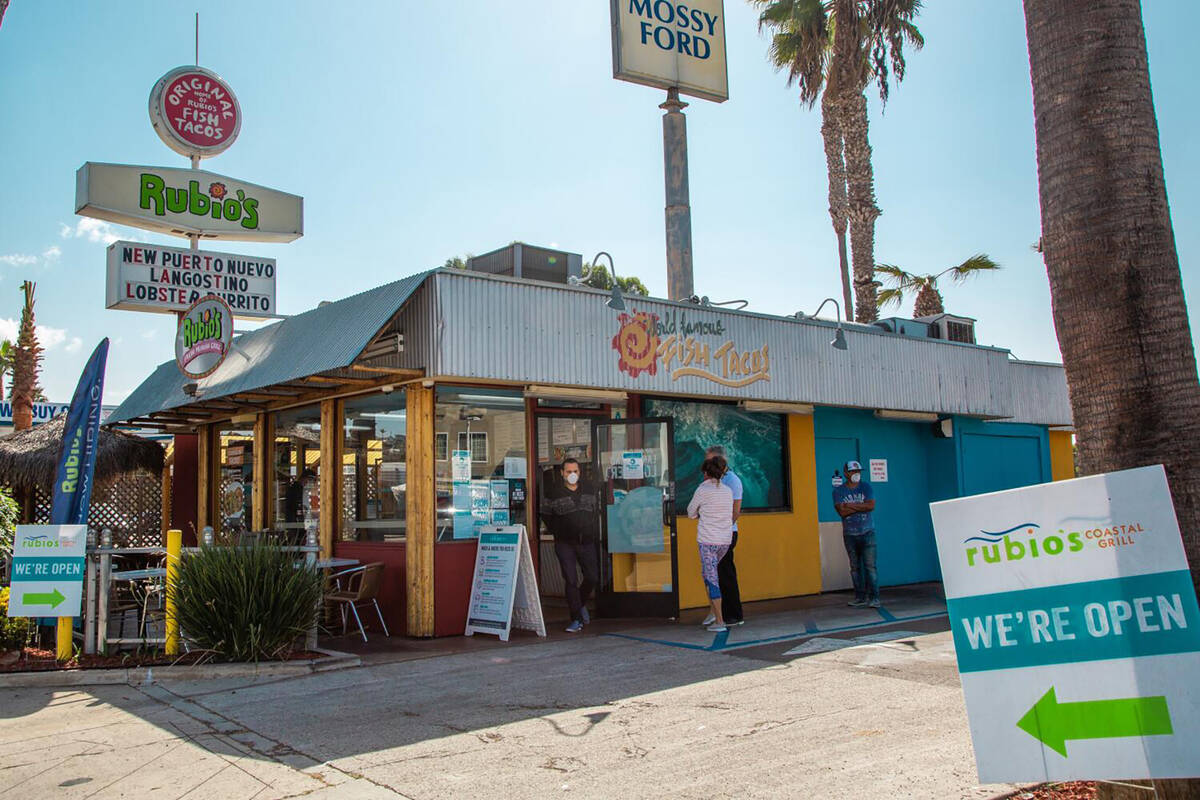Popular fast-casual Mexican chain files for bankruptcy after closing dozens of locations
Rubio’s Coastal Grill, which began in San Diego more than 40 years ago and once boasted close to 200 restaurants, announced Wednesday it is filing for bankruptcy protection with the goal of selling the business.
In a news release issued by the company’s public relations firm, the company said the existing 86 Rubio’s locations will remain operating while the Chapter 11 bankruptcy process proceeds.
This latest filing marks the second bankruptcy in a span of less than four years and comes just days after Rubio’s abruptly closed 48 of its restaurants, 13 of them across San Diego County.
“Rubio’s Coastal Grill is one of the legendary fast-casual chains with a strong and loyal customer following in its communities,” said Nicholas Rubin, chief restructuring officer of Rubio’s Coastal Grill in a statement. “Despite the company’s best efforts to right-size the company, the continued challenging economic conditions have negatively impacted its ability to meet the demands of its debt burden. The company believes the best path forward for Rubio’s is through a court-supervised sale process that will position the brand for long-term success to grow and flourish.”
Rubin said its existing lender has agreed to provide debtor financing and has enough liquidity to continue operating the restaurants during the sale process.
The Chapter 11 petition, filed on Wednesday in Delaware, states that Rubio’s Restaurants has assets of between $10 million and $15 million, while liabilities are estimated to be between $100 million and $500 million. The number of creditors may be as high as 25,000, the company stated in the filing.
Among the 30 largest creditors with no secured claims is its lender, TREW Capital Management with an unsecured claim of nearly $28 million. Also on the list are the California Department of Tax and Fee Administration, San Diego Gas & Electric, Southern California Edison and the San Diego County Treasurer-Tax Collector, with more than $74,000 owed. Multiple unsecured claims are for rent, including $55,665 owed the Aztec Shops at San Diego State University where there is an on-campus Rubio’s.
As it did several days ago, Rubio’s blamed its declining performance on what it said is the difficulty in doing business in California where a wage hike to $20 an hour recently went into effect for all fast food workers. A number of fast food chains have already raised prices in response to the wage increase while others are taking a wait-and-see approach.
Rubio’s said it plans to enter into what is known as a stalking horse purchase agreement to sell the business to an entity that would be formed and controlled by its existing lender. It expects the sale to be completed within 75 days. It will be seeking court approval to continue operations that it said will allow employees to continue receiving their pay and benefits.
The shuttered restaurants in San Diego are spread throughout the county, from Chula Vista to San Marcos. However, there remain 29 Rubio’s outlets in the county, including the original location on Mission Bay Drive in Pacific Beach that opened in 1983 as an homage to the original Baja California-style fish taco.
Ralph Rubio, the co-founder of the Mexican fast casual chain known as the home of the original fish taco, will continue with the company, the news release said, and will “provide his usual inspiration and energy going forward,” the release said.
Rubio has declined to comment on the chain’s financial troubles, which have been building for years, and has not responded to an interview request from the Union-Tribune.
Even with 86 remaining Rubio’s outlets in California, Arizona and Nevada, the chain is a fraction of what it once was. A little less than four years ago, the company had as many as 170 locations in the U.S. Of the still operating restaurants, the bulk of them — 61 — are in California.
Just days ago, San Diego restaurant analyst John Gordon predicted that a bankruptcy filing was inevitable.
“Rubio’s had its day but once it left the publicly traded markets and (current owner) Mill Road Capital took it over, it went into maintenance mode,” Gordon told the Union-Tribune. “Ralph Rubio, the founder, continued to consult with them but nothing much happened.”
The current owner of Rubio’s, private-equity firm Mill Road Capital, acquired the company in 2010 for $91 million, a sale that transformed what had been a publicly traded company into a privately owned business. Five years later the chain changed its identity from Rubio’s Fresh Mexican Grill to Rubio’s Coastal Grill.





















